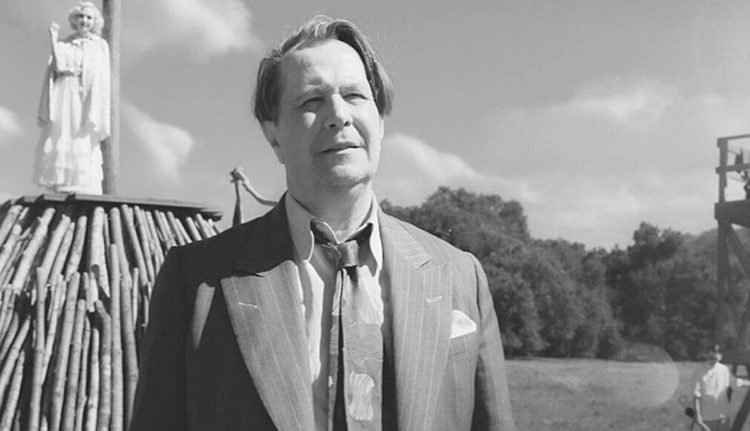“You cannot capture a man’s entire life in two hours, all you can hope is to leave the impression of one.” With that quote from screenwriter Herman J. “Mank” Mankiewicz, we only get a short glimpse into the life of the man who wrote the iconic movie, Citizen Kane.
Told in multiple flashbacks, we center on a 1940 event where Herman (Gary Oldman) is recovering from an auto accident in a small ranch house somewhere in Victorville. Hired by Orson Welles (Tom Burke) to write Citizen Kane (then titled American), it’s going to be an uphill battle as Herman is a chain-smoking, gambling-addicted alcoholic, besides being a brilliant writer. While dictating the William Randolph Hearst based script to his secretary, Rita Alexander (Lilly Collins), he thinks back to his life in Hollywood and the motion picture biz.
Non-linear in the flashbacks (like Pulp Fiction), we ping-pong back and forth with key moments in Herman’s life, as we see his time at Paramount Pictures with his brother Joseph (Tom Pelphrey), then their unusual meeting with powerful studio head Louis B. Mayer (Arliss Howard) at MGM Studios. After that meeting, Herman is introduced to the world of unimaginably rich Hearst (Charles Dance) and his actress wife, Marion Davies (Amanda Seyfried) with whom he strikes up a close friendship.
But screenwriters are an opinionated lot (see the movie Trumbo) and rather politically-minded as well and Herman, who tends to vocalize his Democratic views, gets in trouble alot. Not only at a fancy dinner at Hearst’s castle, but also at a 1934 Republican political rally where he gambles away thousands over who’ll win Governor of California. But, despite all his short-comings, Herman remains loyal to his doting, long-suffering wife Sara (Tuppence Middleton), never straying or having an affair. And, surprisingly, she never leaves him either.
As the script is finalized, Herman has one last request that enrages Orson. He wants screen credit! The rest, as they say, is history. Shot in glorious black & white with terrific attention to detail (it even shows old-time “cigarette burns” when the reels change! For more on that, watch Fight Club), the script was written by David Fincher’s dad, the late Jack Fincher, way back in 2003. Coming in at 2 hrs and 12 mins, it’s a long character study into the man, his life, and the people that surrounded him. Perhaps a bit too long. Whereas the acting and direction/filming is all top-notch, many of the scenes either go on too long or are unnecessary.
Now, I can see where director David Fincher (Se7en, The Game, Fight Club) wanted to honor his papa by not altering the screenplay, but a some edits and losing a few of the flashbacks would have tightened up the lengthy run-time. The movie is less about the actual writing of Kane and more about politics, Hollywood back-door deals, and the super-wealthy. And by the way, let’s talk about Fincher’s impeccable direction that many times copycatted Welles’ style and creativity. And filming it in black and white was just a brilliant idea. His casting was just as brilliant as well.
Gary Oldman, less any make-up or prosthetics this time around, is exceptional as the often inebriated writer with an unfiltered mind and mouth. Amanda Seyfield, nearly unrecognizable, gives a terrific performance as does Charles Dance as the legendary Hearst. But look out for Arliss Howard as L.B. Mayer who, right from his first appearance, tears into his character with a scene-stealing vengeance. And for the short amount of time he has on screen, Tom Burke looks and sounds just like a young Orson Welles.
***Showing exclusively on Netflix





